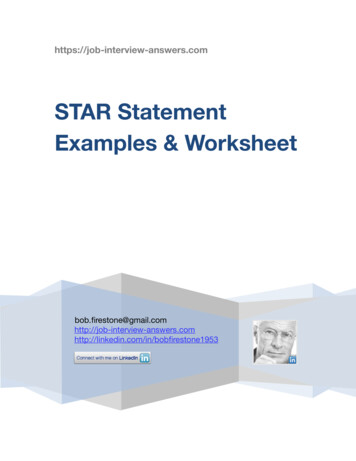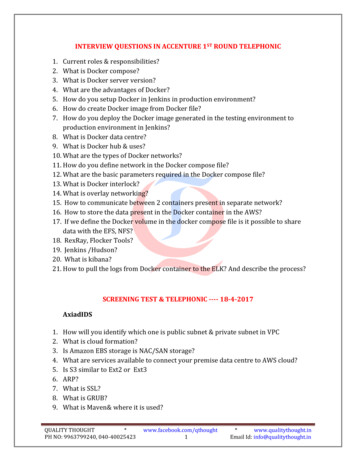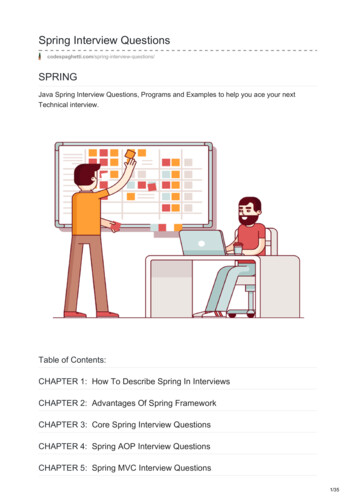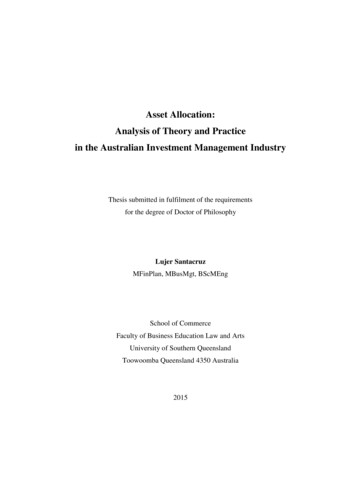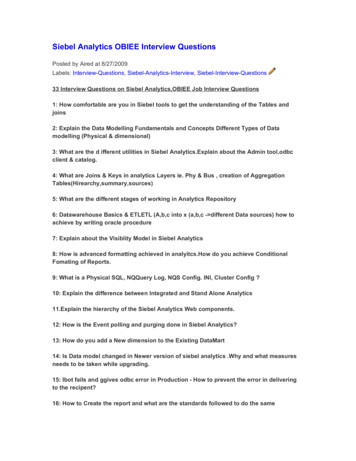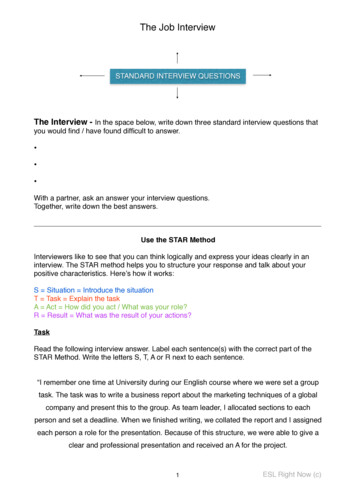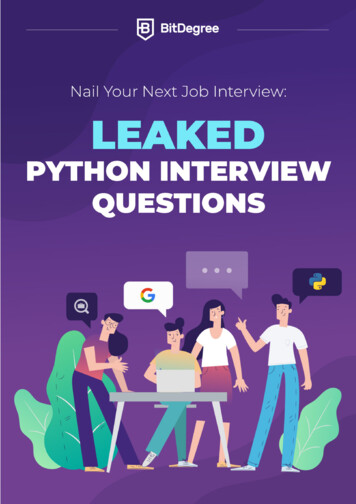
Transcription
1www.bitdegree.org
INTRODUCTIONBeing fluent in a programming language can guaranteeyou a hefty salary and a great job position. Out of thethousands of programming languages that are currently outthere, Python has shown itself to be on the top of the mostpopular language list. Let’s take it from the top and start offby covering the more general Python interview questionsand answers. These are questions that you are most likelyto get asked at the beginning of the interview, just tosee if you truly do have the fundamental understandingabout Python. After that, we’ll move on to some technicalquestions and finish off with a few general tips and advice.2www.bitdegree.org
ww.bitdegree.org
1 What is Python?As you’ve probably expected, this is one of the very first Python interview questions that you’rebound to get asked. Your employers are probably going to expect a concise and thoroughanswer, so let’s provide them one.Python is a portable, high-level programming language that has inbuilt automaticmemory management, threads, strings, is object-based. It is loved for the simplicity and builtin data structure - the fact that Python is open source also contributes to its fame.2 Why is Python BetterThan Java?Some of your Python interview questions might involve comparisons with other programminglanguages - these can be random, but Java seems like the most common one that employersask.In short, Python (when compared with Java) is easier to use and has much better codingspeeds. Also, when it comes to data, Java is statically typed, while Python offers dynamic typing.This is considered to be a huge advancement.3 How Many Data Typesare There in Python?One of the more common interview questions on Python - you might get asked toeither say the number or actually name them. Python has five different data types:1. String4. Dictionary4www.bitdegree.org2. List3. Number5. Tuple
4 What is “Pickling” and“Unpickling”Pickling happens when a module within Python is accepted and converted into a stringmodule, and then later dumped into the file.As opposed to that, unpickling is when you retrieve the string module from the file.For such comparison-based Python interview questions, try to keep your explanations as simpleas possible. Your potential employers will probably appreciate that you are able to explain toughtopics in a simple-to-understand manner.5 What is ‘Lambda’?This one’s pretty straight forward. To put it simply - lambda is an anonymously performedfunction with just one, single expression.6 How is Memory ManagedWithin Python?Python’s private heap space is responsible for memory management. It is only accessibleby an interpreter - if you’re a Python programmer, you won’t be able to reach it. The languagealso has an inbuilt recycler that is responsible for creating more free heap space (this is done byrecycling unused memory).7 What is ‘Pass’?Pass simply indicates a space that should be left blank within the compound statement.5www.bitdegree.org
8 Can you Copy anObject in Python?Even though it sounds like one of the basic Python interview questions, you would probably besurprised how many people actually manage to stumble with it.Yes, you can copy objects in Python, but not all of them. The most general and wellknown way to do it is to use the copy.copy() command.9 How to Delete a File inPython?To delete something in Python, use the command: os.remove(name of the file)10 What is a ‘Dictionary’A dictionary is an in-built data type. Dictionaries are comprised of keys and the key correspondingvalues. Here’s an example:11 How is ‘Tuple’ and a‘List’ Different?The main difference is that lists are slower, but they can be edited, while tuples work faster,but cannot be modified.6www.bitdegree.org
12 What is a ‘Dictionary’?A dictionary is an in-built data type. Dictionaries are comprised of keys and the key correspondingvalues. Here’s an example:13 Is Python an InterpretedLanguage?Again, one of the most commonly asked Python coding interview questions - you shoulddefinitely keep this in mind.Yes, Python is an interpreted programming language. What does this mean? It’s a three-wayprocess - you write the source code, Python converts it into an intermediate language (for easierunderstanding) and then it’s yet again changed into machine codes that are then executed.14 Bonus: PracticeWhich of these is wrong?a) xyz 5,000,000b) x,y,z 1000, 3000, 7000c) x y z 1000 3000 7000d) x y z 5,000,000C is the only one that’s wrong.7www.bitdegree.org
15 How is Python Object Oriented ?Object-oriented programming languages (OOPs) are based on classes and objects of thoseclasses. Python is exactly that. More so, Python possesses the features that are creditedto OOPs - inheritance, polymorphism, etc.16 What is ‘Slicing’?In Python, slicing is when you select multiple items from places like lists, strings and so on.So - those are the more basic Python interview questions that you might receive during yourjob interview. Now, let’s try and move more towards the advanced stuff and some untouchedPython technical interview questions.17 Leaked ExercisesWrite a piece of code that would calculate a list of given numbers.Write a piece of code that would randomize items from the list.8www.bitdegree.org
AdvancedInterviewQuestions9www.bitdegree.org
18 Is There a DifferenceBetween ‘Range’ and‘Xrange’?Yes, albeit it might not be noticeable at first. In terms of functionality and the tasks they perform,both commands are nearly identical.The key difference, however, is that range (when used) brings back a list object, whilexrange returns an xrange object.19 What is the DogpileEffect?This is one of the Python interview questions that might be tricky to memorize at first, so do giveit a few good tries.A Dogpile effect happens when a website’s cache expires, yet it is hit by many differentrequests from the user. This can cause many different problems, from lag spikes to completecrashes.A system called semaphore lock is used to prevent Dogpiles from happening.20 Explain what is Called‘Encapsulation’Encapsulation is one of the features that Python has because it’s an object-oriented programminglanguage.Encapsulation is a process of grouping related data members into one, single place. Alongwith the member themselves, encapsulation also returns their functions, too.10www.bitdegree.org
21 When Does AbnormalTermination Happen?First of all, it should be said - abnormal termination is bad. You don’t want it to happen in yourcoding experience, although it’s almost unavoidable at one point or another, especially whenyou’re a beginner programmer.Abnormal termination is a crash of your program in the middle of its execution, whilethe main tasks are still running. This is usually caused by a faulty code or some software issues.22 Leaked InterviewExerciseIf you would need to count all of the capital letters in a file. How would you do it?23 Does Python Have aCompiler?This is actually one of the tougher Python interview questions, mostly because not many peoplepay attention to it.Python indeed does have its own compiler, but it’s rather easy to miss. This is because itworks automatically - you don’t really notice it.11www.bitdegree.org
24 What is MonkeyPatching?Monkey patching refers to modifications that you would make to the code when it’s alreadyrunning.25 Leaked InterviewExercisesWrite a piece of code that could save images locally. For the exercise imagine that you knowthe image URL.Question: If list1 is [4, 6, 8, 1, 0, 3], what will list1[-1] be?Answer: “-1” always points to the last index in a list, so the answer would be 3.26 What is a ‘Decorator’Decorators are used to inserting new and fresh pieces of code into an already existing class orfunction. With the help of decorators, you can make these codes run before or after the originalone.27 What do the Functions‘help()’ and ‘dir()’ do?Both of these functions can be accessed from the Python interpreter. They are used to viewconsolidated dumps from inbuilt functions.help() shows you the documentation string, while dir() displays the defined symbols.12www.bitdegree.org
28 What are the ‘sub()’, ‘subn()’ and‘split()’ Methods?A module called “re” lets you modify your strings in Python. There are three methods of how youcan do this:sub(): finds specific strings and replaces them.subn(): same as the sub(), but also return the new strings with the exact number of replacements.split(): splits a specific string into a list.This is a very general overview of the three “re” methods of string modifications within Python.It is advisable to do more research on this topic before your job interview - these strings areusually a part of very popular Python interview questions that potential employers ask their jobnominees.29 What do the Processes of‘Compiling’ and ‘Linking’ do?Compiling lets you compile new extensions within your code without any errors. After that,linking can be a fluid process - a successful compilation smoothens out linking and eliminatesany possible issues throughout the process.This can be considered one of the more easier Python coding interview questions if your potentialemployer doesn’t ask you to go in-depth.13www.bitdegree.org
GENERAL TIPSOne good way to leave a good impression is to not act like your lifedepends on the outcome of the interview - if you’re sitting thereand trying to answer Python technical interview questions whilesweating profusely and shaking like a leaf, you might scare theperson your talking to.Also, don’t be cocky - sure, you might have 20 years of expertPython experience, but what good will that do you if you don’t getthe job only because you scoffed at some of the easier Pythoncoding interview questions and came off as arrogant because ofit?Get a good night’s sleep and don’t worry about it - show yourpotential employer the person that you truly are, and you’ll belikely to succeed.14www.bitdegree.org
job interview. Now, let’s try and move more towards the advanced stuff and some untouched Python technical interview questions. 17 Leaked Exercises Write a piece of code that would calculate a list of given numbers. Write a piece of code that would randomize items fro
